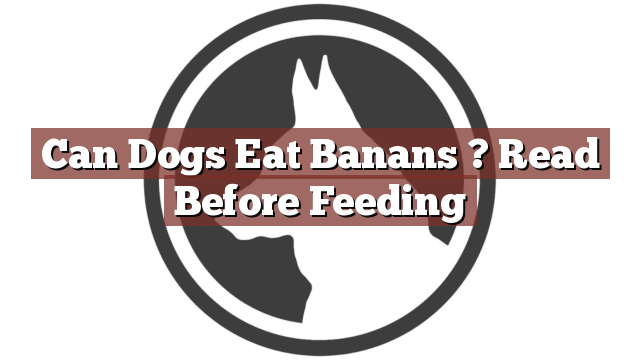Understanding Your Dog’s Dietary Needs
As a responsible dog owner, it’s important to understand the dietary needs of your furry friend. While dogs are primarily carnivorous animals, they can also benefit from certain fruits and vegetables as part of a balanced diet. However, not all human foods are safe for dogs to consume. It’s crucial to know which foods are safe and which ones can be harmful to your canine companion.
Can Dogs Eat Bananas? Read Before Feeding
Can dogs eat bananas? This is a common question among dog owners who may want to share a healthy snack with their pets. The answer is yes, dogs can eat bananas in moderation. Bananas are packed with essential nutrients like potassium, vitamin C, and vitamin B6, which can offer some health benefits to dogs. However, it’s important to remember that bananas should only be given as an occasional treat and not as a substitute for their regular dog food.
Pros and Cons of Feeding Bananas to Dogs
Feeding bananas to your dog can have both pros and cons. On the positive side, bananas are a good source of potassium, which plays a vital role in maintaining proper heart and muscle function in dogs. The vitamin C content in bananas also supports a healthy immune system. Additionally, bananas are low in calories and can serve as a healthy alternative to high-calorie dog treats.
However, it’s essential to consider the cons as well. Bananas are relatively high in sugar and carbohydrates, which means they should be given to dogs in moderation. Too much sugar can lead to weight gain, dental problems, and even diabetes in dogs. Also, the high fiber content in bananas can cause gastrointestinal upset, such as diarrhea, if consumed excessively.
Conclusion: Make an Informed Decision for Your Dog’s Health
In conclusion, while dogs can eat bananas, it’s crucial to do so in moderation. Bananas can offer certain health benefits to dogs when given as an occasional treat, thanks to their potassium and vitamin content. However, the high sugar and fiber content should be taken into consideration, and portion control is important to prevent any adverse effects on your dog’s health.
As with any changes to your dog’s diet, it’s always a good idea to consult with your veterinarian before introducing new foods. They can provide personalized advice based on your dog’s specific needs and health conditions. Remember, a well-balanced diet tailored to your dog’s individual requirements is the key to maintaining their overall health and well-being.
Thank you for taking the time to read through our exploration of [page_title]. As every dog lover knows, our furry friends have unique dietary needs and responses, often varying from one canine to another. This is why it's paramount to approach any changes in their diet with caution and knowledge.
Before introducing any new treats or making alterations to your dog's diet based on our insights, it's crucial to consult with a veterinarian about [page_title]. Their expertise ensures that the choices you make are well-suited to your particular pet's health and well-being.
Even seemingly harmless foods can sometimes lead to allergic reactions or digestive issues, which is why monitoring your dog after introducing any new food item is essential.
The content provided here on [page_title] is crafted with care, thorough research, and a genuine love for dogs. Nevertheless, it serves as a general guideline and should not be considered a substitute for professional veterinary advice.
Always prioritize the expert insights of your veterinarian, and remember that the health and happiness of your furry companion come first.
May your journey with your pet continue to be filled with joy, love, and safe culinary adventures. Happy reading, and even happier snacking for your canine friend!

